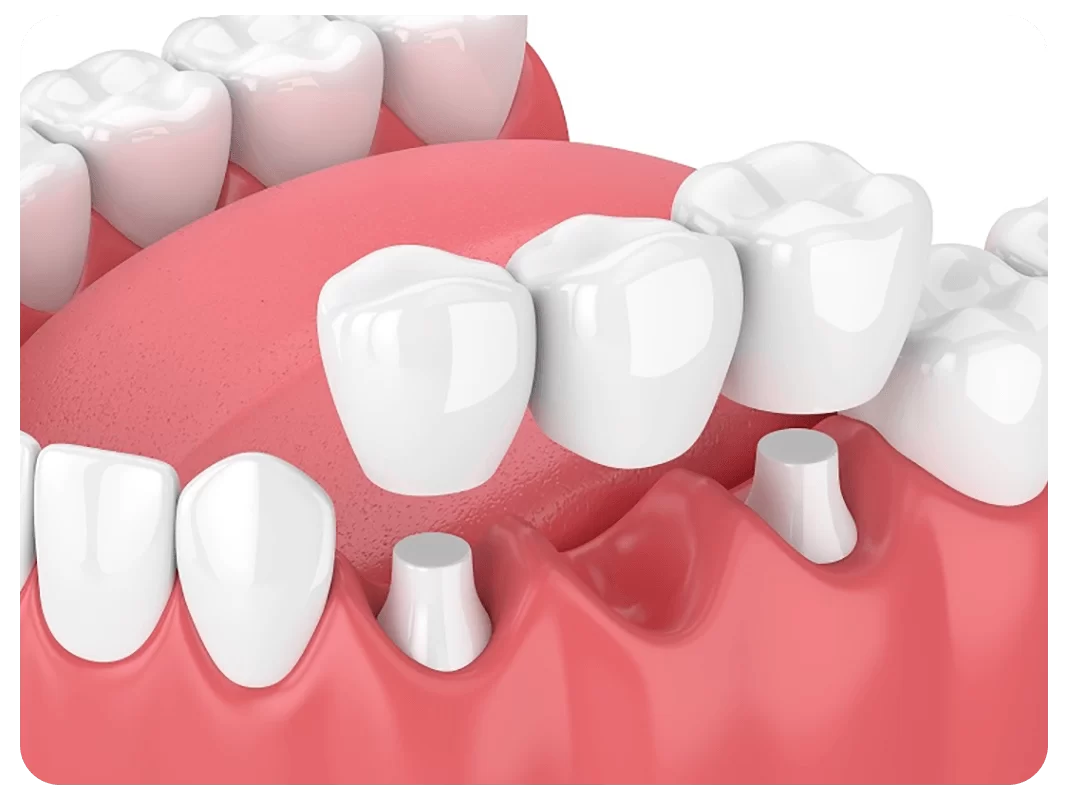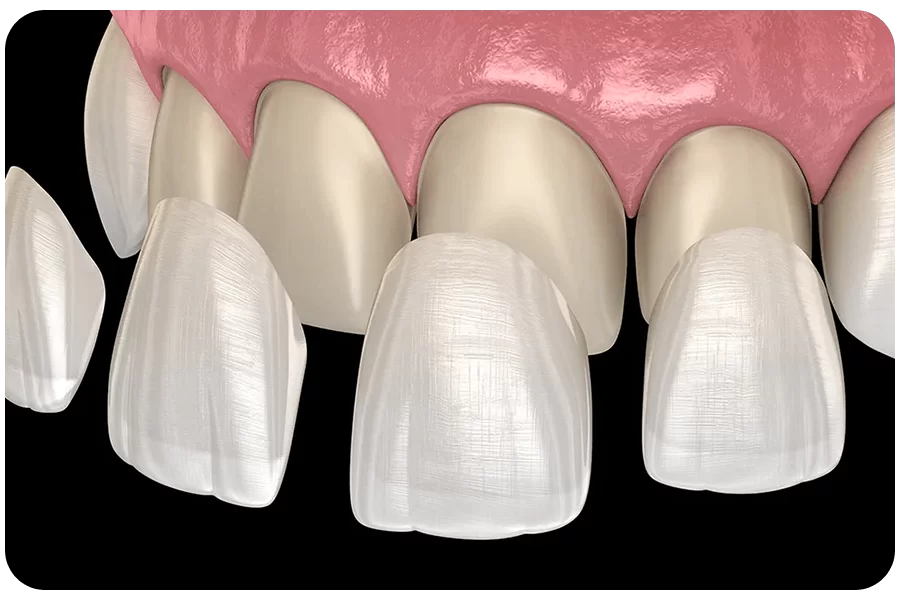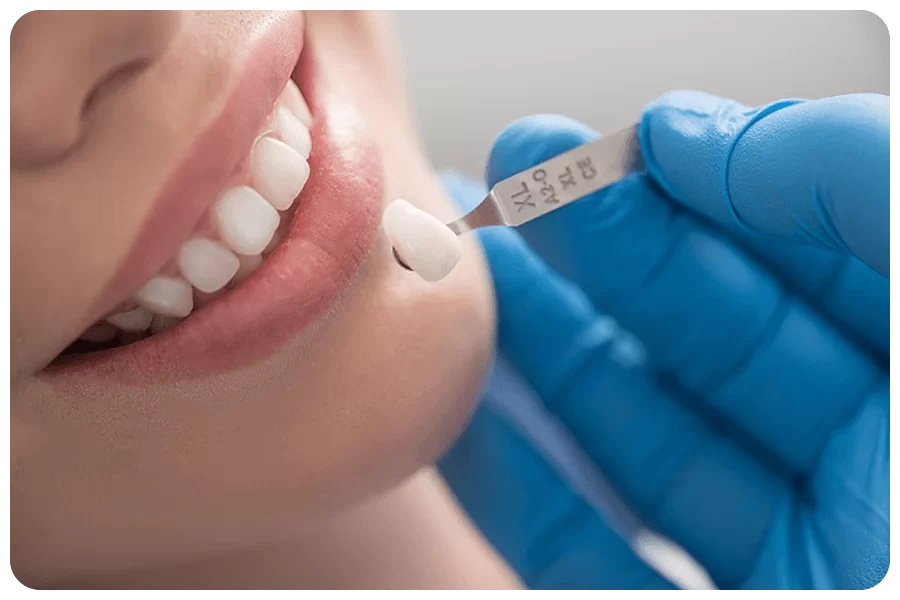Tooth Restoration in Abu Dhabi
Elyzee Hospital is one of the best hospital centers in Abu Dhabi, specializing in Tooth Restoration.

Porcelain Tooth Restoration Treatment in Abu Dhabi
Tooth restoration is a dental procedure aimed at repairing and restoring damaged or decayed teeth. Optimizing both function and appearance in teeth is achieved through a diverse array of treatments under the umbrella term “tooth restoration.” From addressing cavities, chips or significant dental decay, restoring teeth can be key in revitalizing one’s smile while also enhancing overall oral health.
The Benefits of Tooth Restoration
The benefits of tooth restoration are significant and encompass both functional and cosmetic aspects. Here are some key advantages of this procedure:
1. Improved Oral Function
When your teeth acquire damages over time or through accidents like car collisions or falls, dental experts provide solutions such as implants, crowns or filling procedures aimed at restoring the tooth’s proper function.
2. Enhanced Aesthetics
Restorative treatments can improve the appearance of your smile by repairing chips, cracks, or discoloration. They can also help fill gaps caused by missing teeth, giving you a more complete and harmonious smile.


3. Protection Against Decay and Infection
Ensuring optimal dental hygiene requires getting damaged or decayed teeth restored. This approach successfully targets the problem areas where germs may breed and proliferate, mitigating any concerns regarding tooth decay or bacterial infections.
4. Boosted Self-Confidence
Your smile could have an immense impact on how you view yourself. Opting for a healthy diet. Radiant one could radically change your level of self confidence. You’ll feel more comfortable interacting with others effortlessly without having to worry about any dental misgivings on display.
The Best Candidates for Tooth Restoration
The best candidates for tooth restoration are individuals who have:
– Decayed teeth: Tooth decay, also referred to as cavities is a prevalent dental ailment. Dental fillings are a recommended solution for repairing affected teeth and preventing further degradation.
– Damaged or chipped teeth: As time goes by, teeth can undergo damages, such as chipping or cracking, resulting from either trauma or gradual use. Restorative options like dental bonding or crowns can restore the tooth’s structure and appearance.
– Missing teeth: Tooth loss can occur due to various reasons, such as injury, gum disease, or natural aging. Dental implants, bridges, or dentures are suitable options for replacing missing teeth and restoring oral function.
– Discolored or stained teeth: Teeth that are severely discolored or stained may benefit from tooth restoration procedures like dental veneers or teeth whitening, which can improve their appearance and restore a brighter, more vibrant smile.
Consultation with a Dentist and Preparation for the Procedure
Before undergoing any form of tooth restoration process it is advisable to schedule an initial consultation with an experienced dental practitioner. This consultation will entail the assessment of your oral hygiene standards followed by discussions on feasible treatment options. Based on this discussion and evaluation. An individualized dental care protocol aimed at meeting your exclusive needs will be formulated by the attending dental professional.
Preparation for tooth restoration will depend on the type of procedure you will undergo. In general, it may involve:
– Dental examination and X-rays: To ensure the health of your teeth is maintained your dentist will perform a detailed examination during your visit. This includes conducting an extensive review of each tooth and potentially using X rays to assess any harm or decay.
– Discussion of treatment options: At every step of the way during your consultation visit to the dentists’ office they prioritize transparency when it comes to discussing various treatment alternatives available to address the concerns with your oral health- detailing both their advantages as well as any possible risks.
– Treatment planning: After selecting a restoration procedure, your dentist will construct a treatment plan which details the required steps, timeline, and preliminary arrangements.
– Anesthesia options: To ensure a comfortable experience during your dental treatment, its essential for you and your dentist to discuss all available options, including those related to anesthesia. Addressing these matters in advance helps create a collaborative approach towards meeting your specific needs.
– Financial considerations: Your dental professional will kindly and respectfully furnish you with an estimate concerning the expenses related to the process of restoring your tooth. They will also discuss any insurance coverage and available payment plans.
What's Happening During the Procedure
The procedure for restoring teeth can vary greatly. Depending on which treatment option is selected. Its’ worth keeping in mind that specific details will differ accordingly. Here are some common procedures and what to expect during each:
– Dental Fillings: For small to moderate cavities, your dentist will remove the decayed portion of the tooth and fill the area with a durable filling material, such as composite resin or amalgam. The filling material will be shaped and polished to match the natural appearance of your tooth.
– Dental Crowns: Crowns are used to restore extensively damaged or weakened teeth. An impression will be taken to create a custom-made crown that fits snugly over the tooth. A temporary crown may be placed while the permanent crown is being fabricated. Once ready, the permanent crown will be cemented into place, providing strength, protection, and an improved appearance.
– Dental Implants: Dental implants are a permanent solution for replacing missing teeth. The procedure involves surgically placing a titanium implant into the jawbone to serve as an artificial tooth root. After a healing period, an abutment and a custom-made dental crown will be attached to the implant, creating a natural-looking and functional replacement tooth.
– Dental Veneers: Veneers are thin, custom-made shells that are bonded to the front surface of the teeth to improve their appearance. The procedure involves preparing the teeth by removing a small amount of enamel and taking impressions for the fabrication of the veneers. Once ready, the veneers will be securely bonded to the teeth, resulting in a transformed smile.
After the Procedure and Recovery
Abiding by the post-procedure guidelines provided by your dentist is essential for a seamless recovery from a tooth restoration treatment. Below are some overarching directives:
– Take prescribed medications: Your dentist may prescribe pain medications or antibiotics to manage any discomfort or prevent infection. Take them as directed.
– Maintain oral hygiene: We respectfully suggest upholding a habit of daily brushing and flossing in adherence with the professional counsel provided by your dentist. When caring for restored teeth. We recommend prioritizing the usage of a soft bristle toothbrush and non abrasive toothpaste for optimal preservation.
– Attend follow-up appointments: To guarantee the correct recovery of your restoration, regulate potential problems or concerns efficiently, attending follow-up check-ups with your dentist is highly recommended. Regular monitoring will allow for proper tracking of progress and addressing problems as soon as they manifest.
– Avoid certain foods and habits: During the recovery period, it’s best to avoid hard, sticky, or chewy foods that could potentially damage the restoration. Additionally, refrain from habits such as biting nails or chewing on ice to prevent unnecessary stress on the restored teeth.
The Final Result
The final result of tooth restoration will vary depending on the procedure performed and the individual’s specific case. However, in general, you can expect:
– Restored oral function: Whether it’s the ability to chew comfortably or speak clearly, tooth restoration aims to improve your overall oral function, making daily activities easier and more enjoyable.
– Enhanced aesthetics: Tooth restoration procedures are designed to enhance the appearance of your smile by addressing dental imperfections and creating a more harmonious and natural-looking result.
– Increased self-confidence: Your self esteem and confidence can receive a significant lift with a healthy. Stunning smile. This increased confidence will translate to greater ease and conviction in both your personal and work life.
Conclusion
A healthier grin with better functionality and appearance can be attained through tooth restoration procedures that provide multiple benefits. Connecting with your dentist for recommendations on treatments such as fillings, crowns, implants, or veneers is essential in initiating progress toward an alluring smile. The modern advancements in dental practices now offer successful results for full mouth restorations while guaranteeing long-term benefits for one’s overall oral wellness.

FAQs
The duration of a tooth restoration procedure depends on the specific treatment being performed. Simple procedures, such as dental fillings, can often be completed in a single visit, while more complex procedures like dental implants may require multiple appointments and a healing period.
The duration of a tooth restoration procedure depends on the specific treatment being performed. Simple procedures, such as dental fillings, can often be completed in a single visit, while more complex procedures like dental implants may require multiple appointments and a healing period.
Dentists take measures to ensure your comfort during tooth restoration procedures. To promote a positive and minimally unpleasant investigational reaction, local anesthesia is typically administered to induce insensitivity at the location of manipulation. After effects may consist of brief discomfort or tenderness; nevertheless, these symptoms are treatable via accessible non-prescription analgesics.
Numerous determining elements contribute to the longevity of tooth restorations ranging from procedural specifics to self-care behaviors and propensities. With diligent care including meticulous oral hygiene practices coupled with routine check-ups at a dental office – most notably applicable for filling-related procedures – patients can expect optimal restoration performance over a marked span lasting several years at least if not longer.
Make An Appointment

